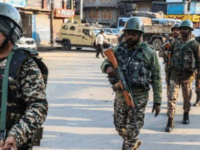Sandeshkhali’s struggle against systemic sexual violence and political machinations

A disturbing, systemic scheme of widespread sexual atrocities has come to light in Sandeshkhali, a village nestled in the southeastern part of West Bengal, close to the Bangladesh border. The perpetrators are local strongmen belonging to the party ruling the State (Trinamool Congress, TMC). TMC leader Shahjahan Sheikh and his goons inflicted large-scale sexual violence —molesting, raping and torturing Dalit and Adivasi women of the village for years— as well as brazen acts of land grabbing displacing local farmers, to convert the land into lucrative fish farms.
After a team from the Enforcement Directorate (ED) investigating a public ration scam raided Shahjahan Sheikh’s premises in Sandeshkhali in January, a mob of local supporters of the TMC leader assaulted the officials, driving them away while Shahjahan himself vanished into hiding. His absence served as a catalyst, emboldening local women to break their silence and rally in protest against what they had endured for years.
A poignant account captured the grim reality: “They brought me into the party office, where a group of people were drinking. For the next one and half days, two of them tortured me in the party office itself…They said they would place my husband’s severed head on my palms if I complained about what they had done to me…Any woman found attractive by a TMC leader would be brought to the party office and leaders would take turns to rape her”, recounted a local woman to a journalist from the independent news website ‘The Wire’. Since the victims supported by local villagers have spoken up and taken to the streets, they and their families have faced threats and violent reprisals, including from local law enforcement colluding with the TMC-led administration. Section 144 has also been imposed to suppress protests in the area, and internet shut down.
The initial response from the upper echelons of the TMC, including Chief Minister Mamata Banerjee, was marked by evasion and deflection. They tried to spin the issue as an electoral ploy by the BJP and the RSS, alleging that the victimized women were manipulated by outsiders. Journalists seeking to report on the ground were met with intimidation and, in some cases, arrest. As late as February 17, the state government and the ruling party were in denial mode, attempting to delegitimize the victims’ claims. One Trinamool Congress MLA even callously suggested that the women’s complexion and bodies meant they were not “real Adivasi women” nor locals.
A party that ascended to power on the back of a mass movement against land acquisition, helmed by the only female Chief Minister in the country, now stands accused of perpetuating and protecting a ruthless and corrupt regime of coercion, land grabbing, and violence against women. Under pressure, the state government has since made some arrests among the local cadres involved, in order to appease public outrage; but it continues to try and keep a lid over the situation.
In a state where the BJP is in the opposition, the latter couldn’t miss an opportunity to jump into the fray, communalise the incident, and further its own agenda. The Hindu far-right has amplified the issue, carried out state-wide demonstrations against what it calls the TMC’s “reign of terror” in West Bengal, and, seizing upon the religious identity of the key abusers, has predictably given it an Islamophobic colouration —for example, by originally falsely portraying the Sandeshkhali oppressors as “Rohingya refugees” or by contending that what happened in that village was a reminder of atrocities against women “in countries like Iraq and Pakistan”.
Nevermind the fact that the BJP has protected prominent serial abusers of the likes of MP Brij Bhushan Singh, approved the release of the Bilkis Bano case criminals convicted of gang rape and murder in Gujarat, or that this party’s lawmakers and politicians regularly indulge in deeply misogynistic and victim-blaming outbursts across the country. Underlining the assaults in Sandeshkhali as being against Hindu women, the BJP’s feigned concern for women’s rights evaporates when victims are of the ‘wrong’ religion or when the perpetrators are Hindu men —especially those harbored within the party itself.
The bigoted narrative of the BJP will be of little solace to the women of Sandeshkhali. So will be Banerjee’s claims that what is happening in Sandeshkhali lies in a clash between tribal and Muslim communities. Gender-based violence and sexual exploitation transcend communities; they are systemic issues stemming from the power dynamics and social structures embedded within the capitalist system —which preys on, profits from, and prejudices against, women’s bodies.
The core tenets of this system go unquestioned by India’s major parties, including the Congress Party and the other formations gathered, along with the TMC, in the ‘INDIA alliance’, and which have remained largely muted over this case. As the Lok Sabha elections are coming close, with women constituting a crucial voting bloc for the TMC, this issue has the potential to develop into a serious political crisis for West Bengal’s ruling party, and to affect the balance of seats in the upcoming Parliament.
While the CPI(M) sent a delegation to visit the area, the supposedly “left” party has spectacularly failed to live up to its expectations during its decades-long tenure in power in the state, and has itself been implicated in multiple instances of violence against women —notably during the heroic struggle against forcible land acquisition in Nandigram in 2007. Sandeshkhali itself used to be a CPI(M) stronghold until about the 2010’s but, like elsewhere, its popular credit has since plummeted.
A reluctance to call out the harrowing abuse scandal in Sandeshkhali, whether for electoral expediency or due to the perpetrators’ presumed religious background, will only serve to bolster the BJP’s narrative and encourage harmful and divisive stereotypes. It grants Modi’s party additional leverage to hypocritically position itself as the sole party standing up for the women of Sandeshkhali. The fact that the far-right is seen as leading the charge in a case of sexual abuse on such a scale, an issue over which it has itself a dreadful record, should serve as a sobering warning about the consequences for the Left if it turns a blind eye to gender oppression and sexual abuse —or refuses to do so consistently across all communities affected.
Now, more than ever, India needs a campaigning socialist feminist force that is steadfast in its commitment to combating all forms of oppression and exploitation, wherever they permeate.





